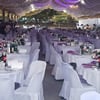Amid proposed new judicial reforms in Israel, in the past few months thousands have taken to the streets in protest against the governmental legislation. But while Israeli society may appear fractured, thousands of Israelis from across the political and religious spectrum will be sitting together this Passover, as one people, united, at Chabad-Lubavitch Seders across Asia and in other backpacker hotspots.
“When people leave Israel, they are no longer interested in talking about politics,” Rabbi Nechemya Wilhelm, who directs Chabad of Bangkok, Thailand, tells Chabad.org. Across Thailand this year, 10,000 Israelis will join a Chabad Seder from Phuket to Ko Samoi. “When they come to Chabad and sit all together, this is the most powerful demonstration that we are all really one.”
The Seders in Thailand serve local community members, businesspeople and travelers from around the world, including many from Israel, with a regular contingent of young Jewish soldiers having just finished their national service.
Last Shabbat, Wilhelm told a story to the 500 Shabbat guests gathered at Chabad of Bangkok, most of them Israeli.
“There were once two brothers—one was married, the other was single,” said the rabbi. “Their father gave them a field as an inheritance and instructed them to divide the produce. One day, the single one said to himself, “I don’t need so much. I’ll give some of my portion to my brother; he has a family to feed.” That night, he added some of his to his brother’s pile. The married brother said to himself, “My brother is single; he has no family. At least let him have some more produce.”
“In the dead of the night, both brothers met on the hill in the field, each giving their portion to the other,” relates Wilhelm. “They embraced, and on that spot, the Holy Temple was built.”
“There’s an alternate version,” continues Wilhelm. “One said, ‘I’ll steal my brother’s portion,’ and the other said, ‘I’ll steal my brother’s portion,’ and on that spot, the Knesset [the Israeli parliament] was built.”
“Neither of these happened,” he told the audience, “but these are the stories of our lives. I see 500 people sitting together, each with different opinions and politics. We’re Jewish, and we sit together. Take this feeling back to Israel with you.”

If Israelis can all sit together and put aside their differences while in the Far East, then why can’t they do that in the Holy Land?
“In Israel, they are more tuned in to the media and their own echo chambers. Once you leave your comfort zone, you reveal your inner self,” Wilhelm says. “When there’s a war in Israel, everyone is united. Let’s have backpacking bring us together, rather than war.”
Thailand’s Seder-goers will be assisted this year by more than 50 rabbinic students and four couples being flown in as Thailand’s portion of the army of helpers Merkos L’Inyonei Chinuch—the educational arm of the Chabad-Lubavitch movement—sends annually to assist at Seders worldwide. Ten Chabad-Lubavitch emissaries in Thailand, who serve in their capacities under Rabbi Yosef Chaim Kantor, Thailand’s chief rabbi and the country’s head Chabad-Lubavitch emissary, will lead the proceedings in the various locations. Kantor, having built Jewish presence and programming in the region virtually from scratch beginning in 1993 with his wife and co-director of Chabad of Thailand, Nechama Dina, takes on much of the fundraising for the Seders for beyond what the modest admissions fees cover.

‘We Don’t Argue Here’
In Nepal, which historically has drawn more of a rough-and-tumble backpacking crowd than Thailand, Chabad has been hosting Passover Seders for 35 years. Chani Lifshitz, co-director of Chabad-Lubavitch of Nepal with her husband, Rabbi Chezki Lifshitz, says that 2,000 Israelis will celebrate Passover with Chabad in Nepal this year. But it’s not just at the Seder where she sees the unity in Israeli society—it’s every day. “More than 500 people pass through here every day,” she tells Chabad.org on a choppy line from the Chabad center in Kathmandu.
She tells of how her husband spoke to the hundreds of Israelis at their Shabbat table last week, emphasizing unity and responsibility for one another.

“People were crying,” says Chani Lifshitz. It was a desperately needed message, she said, noting how Chabad’s zero-politics environment has a longstanding reputation among Israeli travelers. Lifshitz recalls how a woman recently contacted her sharing that as she passed by a demonstration, “I wish I could have had a flag saying, ‘Go to Chabad of Kathmandu and see that you can all sit together.’ ”
“Politics doesn’t come in here; we don’t argue here,” Lifshitz concludes. “People come to Nepal to find themselves, and they have life-changing experiences at Chabad. When we talk, it’s about what unites us, not left and right.”










Join the Discussion